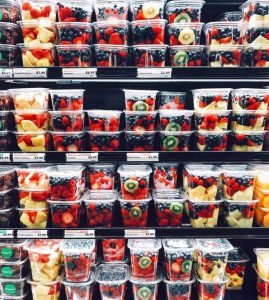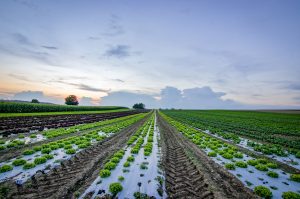“Access to adequate food is a human right, and belongs to the economic, social and cultural rights”
Human rights exist to protect human dignity and they are characterized by principles such as being universal, indivisible, and interlinked. This means that access to food should be a universal experience, which implies that all people all over the world should have access to adequate food during their lives to ensure a healthy and active life. Moreover, the fulfillment of other rights has a huge impact on the fulfillment of the right to food. For example, if a person’s housing conditions are not met, hygiene and food security cannot be ensured for them.
Access to food is usually understood in economic terms, given that money is the resource that allows access to it. However, there are many people that can produce their own food items, but a failure to produce and sustain their crops will lead to a failure to have access to food. Two billion people (25.9%) in the world were experiencing hunger or did not have regular access to nutritious and sufficient food in 2019.
 It is expected that 840 million people will suffer hunger by 2030 if current trends continue globally. This is measured by the percentage of people being undernourished as a reflection of a chronic lack of food intake. The percentages might change from place-to-place, but the figures are still alarming. On the other side of the spectrum, overweight and obesity can also be considered a consequence of food insecurity (not at all times, but certainly when the main food options are calorie-dense, and with high contents of fats and sugars foods, and are more economically affordable than nutrient-dense food). Alongside these indicators of malnourishment, other diseases accompany the situation, all those non-communicable diseases that are somehow associated with lifestyle (e.g. diabetes mellitus, hypertension, high cholesterol, among others).
It is expected that 840 million people will suffer hunger by 2030 if current trends continue globally. This is measured by the percentage of people being undernourished as a reflection of a chronic lack of food intake. The percentages might change from place-to-place, but the figures are still alarming. On the other side of the spectrum, overweight and obesity can also be considered a consequence of food insecurity (not at all times, but certainly when the main food options are calorie-dense, and with high contents of fats and sugars foods, and are more economically affordable than nutrient-dense food). Alongside these indicators of malnourishment, other diseases accompany the situation, all those non-communicable diseases that are somehow associated with lifestyle (e.g. diabetes mellitus, hypertension, high cholesterol, among others).
The last paragraph talks about the consequences at the individual, household, and community level in terms of health and wellbeing. However, it is also very important to remember that the food system is complex, with many elements that are related to each other: the food environment, the food supply, and the food behaviors people have, and all the socio-political environment that surrounds it. There is a vast bibliography describing each of the elements and sub-elements and how they interact with each other. It is important to consider the environmental impact of food production, and current production systems on the land resources, the carbon footprint, the prices of food, food waste, and the livelihood of those who are in the most vital part of the food supply chain– the food producers.
The World Food Day in 2020 (16th October) commemorates the 75th anniversary of the creation of the Food and Agriculture Organization of the United Nations (FAO), and the main theme is “Grow, Nourish, Sustain. Together.” The FAO works to solve the problem of food access through all this time, and this year the focus is on the sustainability of the food system. How to preserve the land and water resources? How to protect the small producers from the forces of the market? How to ensure that food environments offer affordable and nutritious-dense food? How to have fewer intermediaries in the food supply chain? How can a region achieve food sovereignty? How can agroecology be applied in a region? These are some of the questions that could lead to answers to have a food system that is fair to all producers, good to the environment, but also benefits all of us and the future generations.
 We, as individuals, can have an active role in the food system. In my opinion, everything must begin with the knowledge of the food system and how it operates in the region we live in. This can be ensured by being aware of the impact of our buying decisions not only on our health but also on the environment that surrounds us. There is a bigger fight that might be difficult to reach, the one related to improving the living conditions of millions of people, the one related to the distribution and prices of food, the one related to unemployment and fair wages so people can access food. But the one that we can fight, is the one that concerns our own wellbeing, our local economies, and our local environment. Are we being conscious of what we decide to eat? Are we trying to reduce the food waste in our homes? Are we trying to choose foods that have a smaller impact on the environment? Are we supporting our local economies by buying locally produced food products?
We, as individuals, can have an active role in the food system. In my opinion, everything must begin with the knowledge of the food system and how it operates in the region we live in. This can be ensured by being aware of the impact of our buying decisions not only on our health but also on the environment that surrounds us. There is a bigger fight that might be difficult to reach, the one related to improving the living conditions of millions of people, the one related to the distribution and prices of food, the one related to unemployment and fair wages so people can access food. But the one that we can fight, is the one that concerns our own wellbeing, our local economies, and our local environment. Are we being conscious of what we decide to eat? Are we trying to reduce the food waste in our homes? Are we trying to choose foods that have a smaller impact on the environment? Are we supporting our local economies by buying locally produced food products?
As a final note, it is worth to mention that the Nobel Peace Prize this year (2020) has been given to the UN World Food Program (WFP), as their work has resulted in the prevention of using hunger as a weapon of war and conflict (you can find more about this here).
REFERENCES
FAO, IFAD, UNICEF, WFP & WHO 2020. The State of Food Security and Nutrition in the World 2020. Transforming food systems for affordable healthy diets. Rome: FAO.
FOOD AND AGRICULTURE ORGANIZATION OF THE UNITED NATIONS. 2020. 16 October 2020 World Food Day [Online]. Available: http://www.fao.org/world-food-day/home/en/ [Accessed 9 October 2020].
WORLD FOOD PROGRAMME. 2020. Hunger Map 2020 [Online]. Rome, Italy: United Nations World Food Programme. Available: https://www.wfp.org/publications/hunger-map-2020 [Accessed 9 October 2020].





